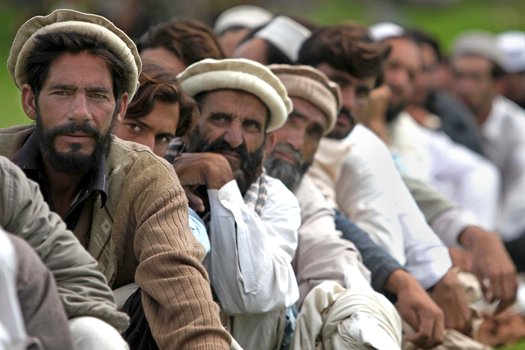One of the central demands of Afghan President Hamid Karzai, in order for him to keep playing ball with the US, was to gain full control over all Afghan prisons after US forces drawdown in 2014. The Obama administration reluctantly agreed to this demand and has been slowly transferring prisoners to Afghan controlled prisons.
The New York Times reports today that the US military “has suspended the transfer of detainees to some Afghan prisons out of concern over continuing human rights abuses and torture.”
First of all, there has been a record of abuse at both US-controlled and Afghan-controlled prisons, and it has been largely ignored by the US. Talk of swapping control of prisoners really picked up in early 2012 when an Afghan investigative commission accused the US military of abusing detainees in the Bagram prison facilities. Detainees interviewed by the investigators spoke of being held in freezing cold cells, forced nudity, physical abuse, and extended isolation. Most of the 3,000 or so detainees in Bagram had been physically abused, hadn’t been charged, had seen no evidence against them, and had no right to be represented by a lawyer. As Attorney for Human Rights First Daphne Eviatar said in a CBS interview, “It’s worse than Guantanamo, because there are fewer rights.”
And then there are the Afghan prisons. Back in October, the United Nations released a report which found that detainees in Afghan-controlled prisons are hung from the ceilings by their wrists, severely beaten with cables and wooden sticks, have their toenails torn off, are treated with electric shock, and even have their genitals twisted until they lose consciousness. The study, which covered 47 facilities sites in 22 provinces, found “a compelling pattern and practice of systematic torture and ill-treatment” during interrogation by U.S.-supported Afghan authorities. And they weren’t all alone: both U.S. and NATO military trainers and counterparts have been working closely with these authorities, consistently supervising the detention facilities and funding their operations.
 In addition to supposed US concern about an increase in abuse at Afghan-controlled prisons, the Times reports, “the American-led coalition said that it had asked the Afghan government to investigate allegations of torture by Afghan Local Police units that have been trained and advised by American Special Operations forces.”
In addition to supposed US concern about an increase in abuse at Afghan-controlled prisons, the Times reports, “the American-led coalition said that it had asked the Afghan government to investigate allegations of torture by Afghan Local Police units that have been trained and advised by American Special Operations forces.”
“Afghan military forces and police that operate effectively and with respect for human rights are central to the success of the U.S. strategy in Afghanistan,” Commander Bill Speaks, a Pentagon spokesman on Afghan policy, told the Times.
Really? The US is concerned with American-trained Afghan forces having respect for human rights? They sure haven’t demonstrated that.
Back in September 2011, Human Rights Watch released a report detailing the widespread human rights abuses being committed by the Afghan Local Police, and how neither Washington or Kabul are holding them accountable or changing policy in light of the crimes. The report “documents serious abuses, such as killings, rape, arbitrary detention, abductions, forcible land grabs, and illegal raids by irregular armed groups in northern Kunduz province and the Afghan Local Police (ALP).”
The ALP has been accused of “beating teenage boys and hammering nails into the feet of one boy,” although no arrests were made. “In April,” the report documents, “four armed ALP members in Baghlan abducted a 13-year-old boy on his way home from the bazaar and took him to the house of an ALP sub-commander, where he was gang raped.” The ALP consistently raids Afghan homes, steal personal belongings, beat residents, and illegally detains Afghans.
Yet in March 2011, General Petraeus told the US Senate that the ALP is “arguably the most critical element in our effort to help Afghanistan develop the capacity to secure itself.” This is America’s version of “respect for human rights.”
This story is indicative of how detrimental the US military adventure in Afghanistan has been. Afghans are stuck between an abusive military occupation by a foreign power, a corrupt, brutal regime backed by a foreign power, and a ruthless militant insurgency that has been bolstered through a decade of guerrilla warfare. Anyone who thinks staying in Afghanistan one day longer is a recipe for altering this course isn’t looking at the facts.



